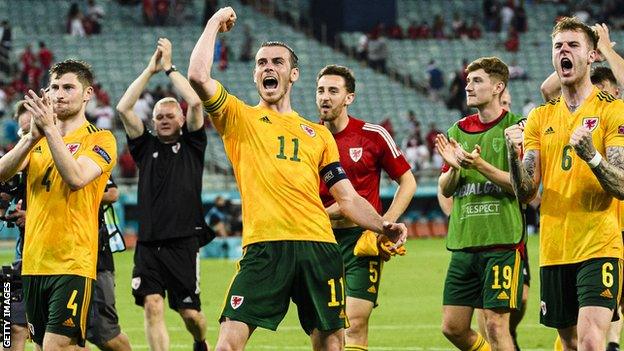Euro 2024 qualifying: Guide to Wales' Group D opponents
- Published

Robert Page (right) led Wales to the second round at Euro 2020
There is the small matter of a first World Cup since 1958 to consider first later this year but, on Sunday, Wales briefly turned their attention to Euro 2024 as they discovered who they will face in qualifying.
Robert Page's side have been drawn with Croatia, Armenia, Turkey and Latvia in Group D, and they will need to finish in the top two to automatically secure their place at a fourth major tournament out of five.
They will open the campaign with a trip to Croatia on Saturday, 25 March - followed by their first home game three days later against Latvia on Tuesday, 28 March.
After hosting Armenia in June, Wales travel to Turkey and Latvia before their home game against Croatia on Sunday, 15 October. They complete their fixtures in November 2023 with a visit to Armenia before a final home game against Turkey,
Considering the heavyweights they managed to swerve, Wales had reason to feel optimistic after Sunday's ceremony in Germany, Euro 2024's host country.
"We've got to be pleased with the group if I'm honest," Page told BBC Radio 5 Live.
"We've avoided Belgium, which is something we were looking forward to because we've played them nine times in 10 years.
"When you try to forecast what it potentially could be, I think it's not a bad result for us.
"It's about us maintaining our standards, maintaining that level of performance that's got us qualification for a World Cup.
"If we do that, there are not many teams in that group that will cause us too many problems."
BBC Sport Wales takes a closer look at Wales' Group D opponents.
Croatia
World ranking: 12 Manager: Zlatko Dalic Captain: Luka Modric
Croatia are among the lowest-ranked top seeds Wales could have been drawn against but, as serial major tournament qualifiers and 2018 World Cup runners-up, they are a force to be reckoned with. At 37 years old, Real Madrid's Luka Modric continues to demonstrate that he is one of the best midfielders in Europe. However, could the World Cup later this year be his final act in international football? Even if that is the case, the likes of Tottenham wing-back Ivan Perisic and Chelsea midfielder Mateo Kovacic embody Croatia's enduring quality. They met Wales in Euro 2020 qualifying, with Croatia winning at home and Gareth Bale's equaliser earning Wales a draw in Cardiff.

Gareth Bale (left) and Luka Modric were Real Madrid team-mates when Wales and Croatia drew 1-1 in 2019
Armenia
World ranking: 93 Manager: Joaquin Caparros Captain: Kamo Hovhannisyan
On paper, Armenia are as kind a draw as Wales could have hoped for from Pot 3. Ranked 93rd in the world, they have never qualified for a major tournament and lost five from six games in their most recent Nations League campaign - as did Wales, albeit against far tougher opposition. Armenia's talisman and record goalscorer, former Arsenal and Manchester United attacking midfielder Henrikh Mkhitaryan, retired from international football earlier this year.
Turkey
World ranking: 45 Manager: Stefan Kuntz Captain: Hakan Calhanoglu
Whereas Armenia are the lowest-ranked of the third seeds, Turkey are the highest-ranked of the teams in Pot 4 and boast several players who represent clubs in Europe's top leagues. A large and populous country whose national side have reached the latter stages of several major tournaments in the past 20 years, Turkey were one of the disappointments of Euro 2020. They exited at the group stage, during which they were beaten 2-0 by Wales, who will take confidence from that meeting in Azerbaijan when the teams meet again next year.

Gareth Bale (centre) and his Wales team-mates celebrate their 2-0 win over Turkey in Baku at Euro 2020
Latvia
World ranking: 134 Manager: Dainis Kazakevics Captain: Antonijs Cernomordijs
As Croatia are Nations League finalists, Group D consists of five rather than six teams and that means Latvia are the lowest-ranked of them all at 134th. They have history in this competition with Turkey, having surprisingly beaten them in a Euro 2004 play-off to qualify for what remains their only appearance at a major tournament. Latvia clinched promotion from the bottom tier of the Nations League last month, topping a group which also included Moldova, Andorra and Lichtenstein.
Fixtures
Saturday, 25 March: Croatia v Wales (19:45 GMT)
Tuesday, 28 March: Wales v Latvia (19:45 BST)
Friday, 16 June: Wales v Armenia (19:45 BST)
Monday, 19 June: Turkey v Wales (19:45 BST)
Monday, 11 September: Latvia v Wales (19:45 BST)
Sunday, 15 October: Wales v Croatia (19:45 BST)
Saturday, 18 November: Armenia v Wales (14:00 GMT)
Tuesday, 21 November: Wales v Turkey (19:45 GMT)
How does Euro 2024 qualifying work?
The top two teams in each of the 10 groups qualify directly for Euro 2024. The groups start on 23 March and end on 21 November 2023.
Germany automatically qualify as hosts, while the remaining three teams will come via the Nations League play-offs.
In the almost-certain event that some of the teams finish in the top two in their Euro 2024 qualifying group, their play-off place will go to the next best team in their Nations League group.
These are the teams guaranteed a play-off place:
League A: Croatia, Spain, Italy, the Netherlands
League B: Scotland, Israel, Bosnia-Herzegovina, Serbia
League C: Turkey, Greece, Kazakhstan, Georgia
The groups in full
Group A: Spain, Scotland, Norway, Georgia, Cyprus
Group B: Netherlands, France, Republic of Ireland, Greece, Gibraltar
Group C: Italy, England, Ukraine, North Macedonia, Malta
Group D: Croatia, Wales, Armenia, Turkey, Latvia
Group E: Poland, Czech Rep, Albania, Faroe Islands, Moldova
Group F: Belgium, Austria, Sweden, Azerbaijan, Estonia
Group G: Hungary, Serbia, Montenegro, Bulgaria, Lithuania
Group H: Denmark, Finland, Slovenia, Kazakhstan, Northern Ireland, San Marino
Group I: Switzerland. Israel, Romania, Kosovo, Belarus, Andorra
Group J: Portugal, Bosnia and Herzegovina, Iceland, Luxembourg, Slovakia, Liechtenstein